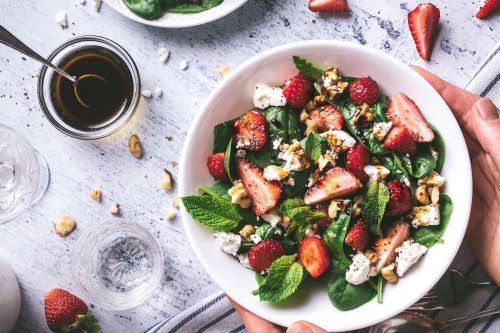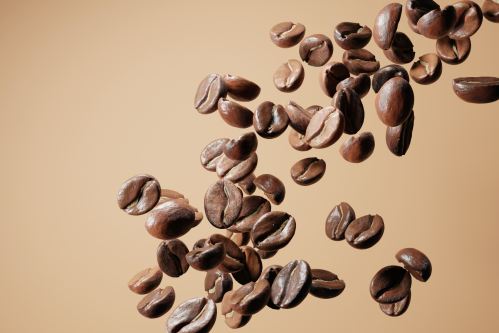Sugar, chronic stress, and environmental toxins all contribute to inflammation—your immune system’s response to irritants in and outside of your body. Your internal systems use inflammation to protect you, but when the relationship gets thrown off balance, it can affect your overall health. That’s why registered dietitians Wendy Lopez, RD, and Jessica Jones, RD, hosts of the Food Heaven podcast, recommend one anti-inflammatory food list to their clients again and again.
In a recent episode, Jones and Lopez, joined by guest Hadis Ghoghaie, RDN, referenced an anti-inflammatory food pyramid created by Andrew Weil, MD, founder and director of the Andrew Weil Center for Integrative Medicine at the University of Arizona. “It’s great because it’s not a diet. It’s not saying you have to eat this or not that. It’s really just different foods to add to your diet for more variety. It has a really large number of vegetables [in it], and I tell people: ‘Listen, if you can even add two vegetables or three a day, that’s great,'” said Ghoghaie. The pyramid doesn’t restrict your diet; instead, it suggests foods to add for their anti-inflammatory effects.
“It is becoming increasingly clear that chronic inflammation is the root cause of many serious illnesses—including heart disease, many cancers, and Alzheimer’s disease,” writes Dr. Weil on his website. He offers an in-depth breakdown of how to create an entire diet that keeps inflammation protecting your body rather than harming it. But Ghoghaie, Lopez, and Jones agree: Dr’s Weil’s interactive food pyramid is the best place to start changing your eating habits in small but meaningful ways.
Dr. Weil’s anti-inflammatory food list from bottom to top
1. vegetables and fruits
Dr. Weil recommends reaching for fruits and veggies that come in rainbow variety. Among other vitamins and minerals, he says that fruits are rich in flavonoids and carotenoids that have anti-inflammatory effects.
The produce to always, always buy organic:
2. Beans and legumes, whole grains, and pasta
Dr. Weil recommends 2 to 3 servings of beans per day of the Anasazi, adzuki, and black variety. “Beans are rich in folic acid, magnesium, potassium and soluble fiber,” he writes. “They are a low-glycemic-load food. Eat them well cooked either whole or pureed into spreads like hummus.”
Yes, you can eat pasta every day:
3. Healthy fats
Five to seven servings of healthy fats a day fit into a healthy diet, says Dr. Weil. Walnuts, extra-virgin olive oil, and avocado are just a few key sources. “Healthy fats are those rich in either monounsaturated or omega-3 fats. Extra-virgin olive oil is rich in polyphenols with antioxidant activity,” he writes.
Why avocados are all the (nutritional) rage:
4. fish and shellfish
Dr. Weil says seafoods like wild Alaskan salmon, herring, sardines, and black cod all contain anti-inflammatory omega-3s. Two to six servings a week are just what the doctor ordered.
5. whole-soy foods
“Soy foods contain isoflavones that have antioxidant activity and are protective against cancer. Choose whole-soy foods over fractionated foods like isolated soy-protein powders and imitation meats made with soy isolate,” recommends Dr. Weil. Try one to two servings a day of tofu, tempeh, edamame, soy nuts, soy milk.
Everything you ever wondered about soy:
6. cooked asian mushrooms
You may have never heard of these babies, but Dr. Weil loves them! In fact, you can eat them in unlimited quantities. “These mushrooms contain compounds that enhance immune function. Never eat mushrooms raw, and minimize consumption of common commercial button mushrooms (including cremini and Portobello),” writes Dr. Weil.
How to make medicinal mushroom dressing:
7. Other sources of animal protein (eggs, yogurt, lean meats, etc)
Dr. Weil limits the consumption of these foods to once or twice a week. “If you eat chicken, choose organic, cage-free chicken and remove the skin and associated fat. Use organic, high-quality dairy products moderately, primarily yogurt and natural cheeses such as Emmental (Swiss), Jarlsberg, and true Parmesan. If you eat eggs, choose omega-3-enriched eggs (from hens that are fed a flax-meal-enriched diet) or organic eggs from free-range chickens,” recommends Dr. Weil.
Your FAQs about eggs, answered:
8. herbs and spices
Garlic! Ginger! Turmeric! Cinnamon! Dr. Weil loves them all.
What you need to know about turmeric:
9. tea
“Tea is rich in catechins, antioxidant compounds that reduce inflammation. Purchase high-quality tea and learn how to brew it correctly for maximum taste and health benefits,” writes Dr. Weil.
Digestive-boosting peppermint tea:
10. supplements
Dr. Weil says that you should choose supplements based on the gaps in your diet. Talk to your physician to decide which ones are right for your eating style.
Recommended supplements for women:
11. Red wine
Keep your red wine servings to 2 glasses a week. “Red wine has beneficial antioxidant activity,” says Dr. Weil.
12. Plain dark chocolate
“Dark chocolate provides polyphenols with antioxidant activity. Choose dark chocolate with at least 70 percent pure cacao and have an ounce a few times a week. Fruit sorbet is a better option than other frozen desserts,” recommends the doctor. Dried fruit, eaten sparingly, can also be an anti-inflammatory dessert.
The golden rules of fighting inflammation, according to experts. Plus, what you need to know about Paleo—another diet that seeks to reduce inflammation.
Sign Up for Our Daily Newsletter
Get all the latest in wellness, trends, food, fitness, beauty, and more delivered right to your inbox.
Got it, you've been added to our email list.











